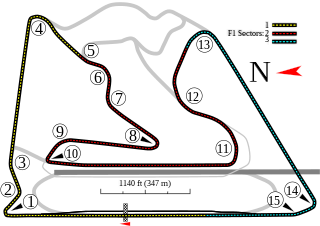
The Bahrain Grand Prix, officially known as the Gulf Air Bahrain Grand Prix for sponsorship reasons, is a Formula One motor racing event in Bahrain. The first race took place at the Bahrain International Circuit on 4 April 2004. It made history as the first Formula One Grand Prix to be held in the Middle East, and was given the award for the "Best Organised Grand Prix" by the FIA. The race has in the past been the third race of the Formula One calendar. However, in the 2006 season, Bahrain swapped places with the traditional opener, the Australian Grand Prix, which was pushed back to avoid a clash with the Commonwealth Games. In 2010, Bahrain staged the opening race of the 2010 season and the cars drove the full 6.299 km (3.914 mi) "Endurance Circuit" to celebrate F1's 'diamond jubilee'. In 2021, the Bahrain Grand Prix was the season opener again because the 2021 Australian Grand Prix was cancelled due to the COVID-19 pandemic.

Women's rights have been a cornerstone of the political reforms initiated by King Hamad, with women gaining the right to vote and stand as candidates in national elections for the first time after the constitution was amended in 2002. The extension of equal political rights has been accompanied by a conscious drive to promote women to positions of authority within government.
Torture in Bahrain refers to the violation of Bahrain's obligations as a state party to the United Nations Convention against Torture and Other Cruel, Inhuman or Degrading Treatment or Punishment and other international treaties and disregard for the prohibition of torture enshrined in Bahraini law.
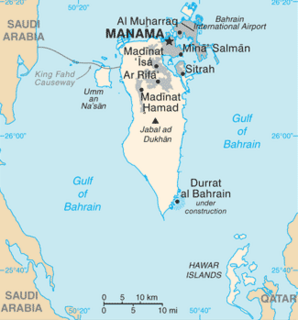
The 1990s uprising in Bahrain also known as the uprising of dignity was an uprising in Bahrain between 1994 and 1999 in which leftists, liberals and Islamists joined forces to demand democratic reforms. The uprising caused approximately forty deaths and ended after Hamad bin Isa Al Khalifa became the Emir of Bahrain in 1999 and a referendum on 14–15 February 2001 massively supported the National Action Charter. The uprising resulted in the deaths of around 40 civilians and at least one Bahraini soldier.

Human rights in the Middle East have been shaped by the legal and political development of international human rights law after the Second World War, and their application to the Middle East. The 2004 United Nations Arab Human Development Report (AHDR) claimed that although Arab-Islamic tradition does hold unique importance for ideas of human welfare, History has proven that "they were not sufficiently prevalent in society to foster a culture based on a political contract, and allow for the legitimacy of differences of opinion, dialogue and transfer of power." Issues of the validity of democracy in the region and human rights are at the very centre of the challenges facing Middle Eastern society today.

Bahrain's record on human rights has been described by Human Rights Watch as "dismal", and having "deteriorated sharply in the latter half of 2010". Their subsequent report in 2020 noted that the human rights situation in the country had not improved.

Abdulhadi Abdulla Hubail al-Khawaja is a Bahraini political activist. On 22 June 2011, al-Khawaja and eight others were sentenced to life imprisonment following the suppression of pro-democracy protests against the Bahraini government. al-Khawaja has previously gone on a series of hunger strikes while serving his life sentence, in protest of the political conditions in Bahrain.
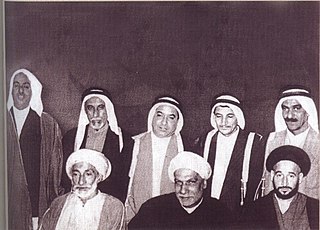
The National Union Committee was a nationalist reformist political organization formed in Bahrain in 1954. The committee was formed by reformists in response to sectarian clashes between Sunni and Shia members of the population. Its foundations were laid in the journal, Sawt al-Bahrain, which was founded and published by these reformist figures. The original aims were to push for an elected popular assembly, a codified system of civil and criminal law, the establishment of an appellate court, the right to form trade unions, an end to British colonial influence, and an end to sectarianism.

Bahrain, officially the Kingdom of Bahrain, is an island country in Western Asia. It is situated on the Persian Gulf, and comprises a small archipelago made up of 50 natural islands and an additional 33 artificial islands, centered on Bahrain Island which makes up around 83 percent of the country's landmass. Bahrain is situated between Qatar and the northeastern coast of Saudi Arabia, to which it is connected by the King Fahd Causeway. According to the 2020 census, the country's population numbers 1,501,635, of which 712,362 are Bahraini nationals. Bahrain spans some 760 square kilometres (290 sq mi), and is the third-smallest nation in Asia after the Maldives and Singapore. The capital and largest city is Manama.
The Manama incident on August 26, 2010 involved the arrest in the Seef shopping mall in Manama, Bahrain, of Fakhria al-Singace, the sister of Dr Abdul Jalil Al-Singace, human-rights spokesperson for the Bahrain opposition Haq Movement. According to The New York Times, three women wearing the niqāb and abaya entered the mall and unfurled a banner reading, "It is forbidden to arbitrarily arrest and detain people". More than a dozen plainclothes and uniformed police officers surrounded them, and Fakhria al-Singace was handcuffed and arrested after being pinned spread-eagled to a cafe table. She was released the next day.

The 2011Bahraini uprising was a series of anti-government protests in Bahrain led by the Shia-dominant and some Sunni minority Bahraini opposition from 2011 until 2014. The protests were inspired by the unrest of the 2011 Arab Spring and protests in Tunisia and Egypt and escalated to daily clashes after the Bahraini government repressed the revolt with the support of the Gulf Cooperation Council and Peninsula Shield Force. The Bahraini protests were a series of demonstrations, amounting to a sustained campaign of non-violent civil disobedience and some violent resistance in the Persian Gulf country of Bahrain. As part of the revolutionary wave of protests in the Middle East and North Africa following the self-immolation of Mohamed Bouazizi in Tunisia, the Bahraini protests were initially aimed at achieving greater political freedom and equality for the 70% Shia population.

Nabeel Ahmed Abdulrasool Rajab is a Bahraini human rights activist and opposition leader. He is a member of the Advisory Committee of Human Rights Watch's Middle East Division, Deputy Secretary General for the International Federation for Human Rights (FIDH), former chairman of CARAM Asia, member of the Advisory Board of the Bahrain Rehabilitation and Anti-Violence Organization (BRAVO), and Founding Director of the Gulf Centre for Human Rights (GCHR).
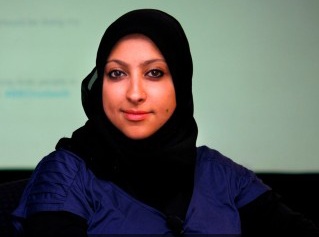
Maryam Abdulhadi Al-Khawaja is a Bahraini human rights activist. She is the daughter of the Bahraini human rights activist Abdulhadi al-Khawaja and former co-director of the Gulf Center for Human Rights (GCHR). She is currently the Special Advisor on Advocacy with the GCHR, and works as a consultant with NGOs. She's a board member of the International Service for Human Rights and No Hiding Place. She serves as the Vice Chair on the Board of the Urgent Action Fund.
Naji Ali Hassan Fateel is a Bahraini human rights activist and member of the Board of Directors of the Bahraini human rights NGO Bahrain Youth Society for Human Rights (BYSHR). Since 2007 he has been imprisoned, tortured and the target of death threats during the Bahraini uprising (2011–present). He has been the subject of urgent appeals by international human rights organisations and the United nations special Rapporteur on Human Rights Defenders.

Zainab Abdulhadi al-Khawaja is a Bahraini human rights activist, and a participant in the Bahraini uprising. She rose to prominence after posting tweets online about the protests under the name AngryArabiya as well as for protesting her father Abdulhadi Alkhawaja's detention during his hunger strike.
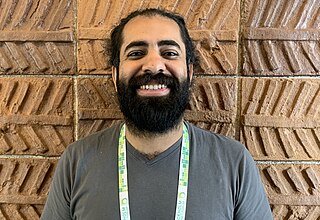
Mohammed Abdulnabi al-Maskati is a Bahraini human rights activist and digital security consultant with Front Line Defenders for Middle East and North Africa. He is the founder of the Bahrain Youth Society for Human Rights (BYSHR), a leading group in the 2011-2012 Bahraini uprising.

Abdulwahab Hussain Ali Ahmed Esmael is a Bahraini political activist, writer, religious figure and philosopher. He was one of the most prominent opposition leaders in the 1990s uprising when he was arrested twice for a total length of five years in which he was allegedly subjected to solitary confinement and torture. After his release in 2001, he supported government reform plans.

The Bahrain health worker trials were a series of legal cases in which forty-eight doctors, nurses, and dentists faced charges for their actions during the Bahraini uprising of 2011. In September 2011, twenty of the health workers were convicted by a military court of felonies including "stockpiling weapons" and "plotting to overthrow the government". The remaining twenty-eight were charged with misdemeanors and tried separately. The following month, the felony sentences were overturned, and it was announced that the defendants would be retried by a civilian court. Retrials began in March 2012, but were postponed until June 14. Convictions against nine of the defendants were quashed and reduced against another nine. The Court of Cassation upheld the sentences against the remaining nine on 1 October.
The background of the Bahraini uprising dates back to the beginning of the twentieth century. The Bahraini people have protested sporadically throughout the last decades demanding social, economic and political rights. Demonstrations were present as early as the 1920s and the first municipal election was held in 1926. Ruled by Al Khalifas since 1783, Bahrain was a British protectorate for most of the twentieth century. The National Union Committee (NUC) formed in 1954 was the earliest serious challenge to the status quo. Two year after its formation, NUC leaders were imprisoned and deported by authorities.

The Bahrain Thirteen are thirteen Bahraini opposition leaders, rights activists, bloggers and Shia clerics arrested between 17 March and 9 April 2011 in connection with their role in the national uprising. In June 2011, they were tried by a special military court, the National Safety Court, and convicted of "setting up terror groups to topple the royal regime and change the constitution"; they received sentences ranging from two years to life in prison. A military appeal court upheld the sentences in September. The trial was "one of the most prominent" before the National Safety Court. A retrial in a civilian court was held in April 2012 but the accused were not released from prison. The sentences were upheld again on 4 September 2012. On 7 January 2013, the defendants lost their last chance of appeal when the Court of Cassation, Bahrain's top court upheld the sentences.














